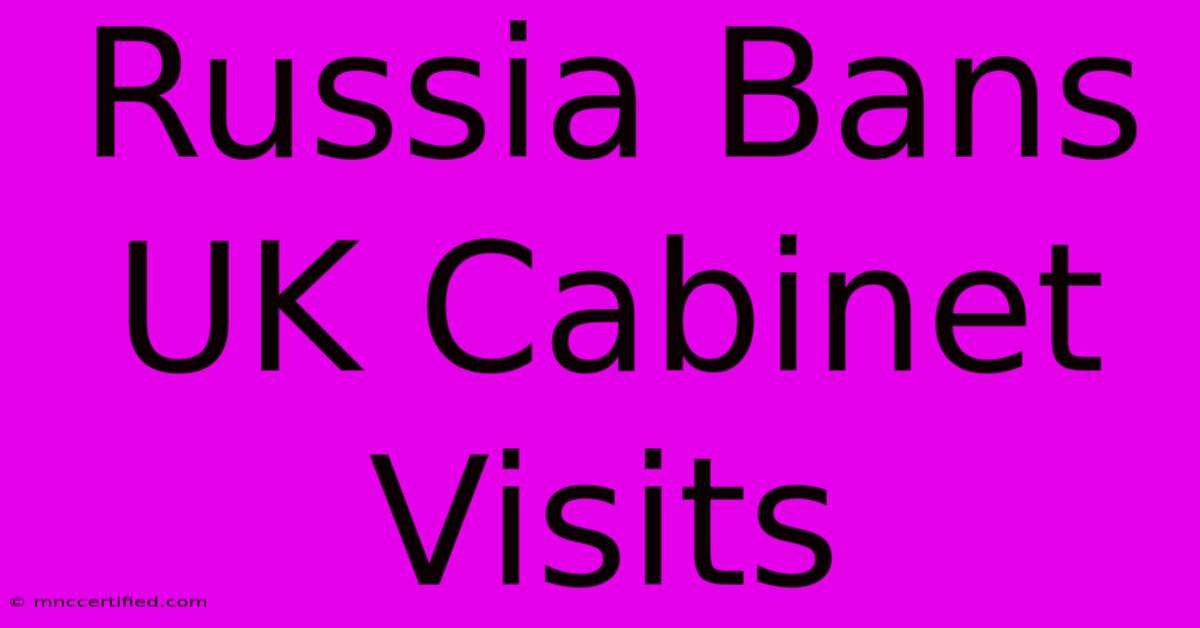Russia Bans UK Cabinet Visits

Table of Contents
Russia Bans UK Cabinet Visits: A Deep Dive into the Geopolitical Fallout
The recent ban imposed by Russia on visits from UK cabinet ministers has sent shockwaves through the already strained relationship between the two nations. This dramatic escalation marks a significant turning point, raising questions about the future of UK-Russia relations and the broader geopolitical landscape. This article will delve into the reasons behind the ban, its potential consequences, and the wider implications for international diplomacy.
Understanding the Roots of the Ban
The ban, announced on [Insert Date of Announcement], directly targets UK cabinet members, effectively barring them from entering Russian territory. While the official statement from the Russian government cited [Insert Official Reason Given by Russia], analysts believe the decision is a multifaceted response to a series of escalating tensions between the two countries. These tensions include:
- The Ukraine Conflict: Russia's ongoing military intervention in Ukraine has been a major point of contention with the UK, which has consistently condemned Russia's actions and imposed sanctions. The UK's vocal support for Ukraine and its provision of military aid are likely key factors driving Russia's decision.
- Allegations of Espionage and Interference: Accusations of Russian interference in UK domestic affairs, including alleged espionage and cyberattacks, have further poisoned the relationship. These claims, though often denied by Russia, contribute to a climate of distrust.
- Sanctions and Counter-Sanctions: The UK, along with its allies, has imposed numerous sanctions on Russia in response to its actions in Ukraine. These sanctions, targeting individuals, businesses, and sectors of the Russian economy, have undoubtedly fueled retaliatory measures from Moscow. The ban on UK cabinet visits can be seen as a direct counter-sanction.
- Navalny's Case: The poisoning and imprisonment of Alexei Navalny, a prominent Russian opposition figure, has also strained relations. The UK's strong condemnation of Navalny's treatment and its calls for his release likely played a role in the deteriorating relationship.
Beyond the Official Narrative: Unpacking the Real Motivations
While the official reasons given by the Kremlin might provide a surface-level explanation, the ban likely reflects a deeper desire by Russia to:
- Signal Strength: The ban is a clear demonstration of Russia's displeasure and a way to assert its power on the international stage.
- Escalate Pressure: By restricting access for UK officials, Russia aims to pressure the UK to reconsider its stance on issues such as Ukraine and sanctions.
- Isolate the UK: The ban is part of a broader pattern of Russia attempting to isolate itself from Western criticism and influence.
The Wider Implications: A Geopolitical Earthquake?
The ban on UK cabinet visits is more than just a symbolic gesture; it carries significant implications for:
- Bilateral Relations: The ban significantly hampers any possibility of high-level dialogue and cooperation between the two countries, making diplomatic solutions to existing conflicts even more challenging.
- International Stability: The deterioration of UK-Russia relations contributes to a more unstable geopolitical environment, potentially exacerbating existing tensions and increasing the risk of further conflict.
- Trust and Cooperation: The ban undermines trust and cooperation, not only between the UK and Russia but also within the broader international community.
What's Next?
The future of UK-Russia relations remains uncertain. The ban signals a deep freeze in official communication, making any immediate improvements unlikely. However, the possibility of de-escalation remains. This could depend on several factors, including:
- Changes in Russia's Policy: A shift in Russia's approach to Ukraine and its relations with the West could potentially lead to a thawing of relations.
- Mediation Efforts: International efforts to mediate the conflict and encourage dialogue between the UK and Russia could be crucial.
- Internal Changes within Russia: Any significant internal political shifts within Russia could potentially alter its foreign policy trajectory.
The ban on UK cabinet visits represents a stark escalation in the already tense relationship between the UK and Russia. The implications are far-reaching and underscore the need for careful diplomacy and international cooperation to navigate these challenging times. Only time will tell if this represents a temporary setback or a prolonged period of strained relations between the two nations.

Thank you for visiting our website wich cover about Russia Bans UK Cabinet Visits. We hope the information provided has been useful to you. Feel free to contact us if you have any questions or need further assistance. See you next time and dont miss to bookmark.
Featured Posts
-
Alta Policy Of Title Insurance
Nov 27, 2024
-
What Is Occupational Insurance
Nov 27, 2024
-
Brightway Insurance Fort Myers
Nov 27, 2024
-
Does Insurance Cover Gum Graft
Nov 27, 2024
-
Morrisons Stock Shortages Spark Concern
Nov 27, 2024